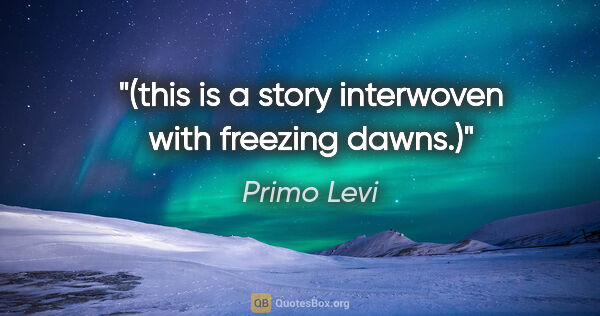Story Quotes (page 67)
The useless days will add up to something. The shitty waitressing jobs. The hours writing in your journal. The long meandering walks. The hours reading poetry and story collections and novels and dead people’s diaries and wondering about sex and God and whether you should shave under your arms or not. These things are your becoming.
Cheryl Strayed
Beneath the gore and smoke and loam, this book is about the evanescence of life, and why some men choose to fill their brief allotment of time engaging the impossible, others in the manufacture of sorrow. In the end it is a story of the ineluctable conflict between good and evil, daylight and darkness, the White City and the Black.
Erik Larson
A man listening to a story is in the company of the storyteller; even a man reading one shares this companionship. The reader of a novel, however, is isolated, more so than any other reader(For even the reader of a poem is ready to utter the words, for the benet of the listener.) In this solitude of his, the reader ofa novel seizes upon his material more jealously than anyone else. He is ready to make it completely his own, to devour it, as it were. Indeed, he destroys, he swallows up the...
Walter Benjamin
Keep away from her," said Ameer Merchant, but once the inexorable dynamic of the mythic has been set in motion, you might as well try and keep bees from honey, crooks from money, politicians from babies, philosophers from maybes. Vina had her hooks in me, and the consequence was the story of my life.
Salman Rushdie
Among Chuang-tzu's many skills, he was an expert draftsman. The king asked him to draw a crab. Chuang-tzu replied that he needed five years, a country house, and twelve servants. Five years later the drawing was still not begun. "I need another five years," said Chuang-tzu. The king granted them. At the end of these ten years, Chuang-tzu took up his brush and, in an instant, with a single stroke, he drew a crab, the most perfect crab ever seen. [Calvino retells this Chinese story]
Italo Calvino
[[diving into the wreck]]First having read the book of myths, and loaded the camera, and checked the edge of the knife-blade[...]And now: it is easy to forgetwhat I came foramong so many who have alwayslived here...[...]the thing I came for: the wreck and not the story of the wreckthe thing itself and not the myththe drowned face always staringtoward the sunthe evidence of damageworn by salt and away into this threadbare beautythe ribs of the disastercurving their assertionamong the tentative...
Adrienne Rich
As far as I can recall, the initial shiver of inspiration [for Lolita] was somehow prompted by a newspaper story about an ape in the Jardin des Plantes, who, after months of coaxing by a scientist, produced the first drawing ever charcoaled by an animal: this sketch showed the bars of the poor creature's cage.
Vladimir Nabokov

